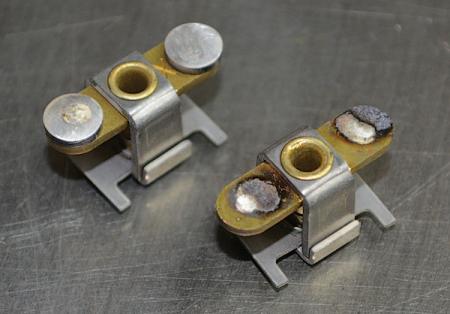Universal III relay contacts…
We have a Vandercook Universal III. I had a few spare relay contacts, but have just burned out a couple.
Anyone have an idea if there is a way to get these or does anyone know if you could adhere the actual contact?
I was thinking that maybe there was a way to get the whole relay or maybe get the contacts (disks) and weld(?) them on where they are missing. I’m not exactly sure if they’ve burned off or just fallen off. We do have at least a couple of the contacts (disks).
On the left is a new one. On the right is one that burned out yesterday.
Thanks for any suggestions.

130120-relay-contacts-briar-press.jpg
Don’t know if this will help or not, but I just found it through a Google search
http://vandercookpress.info/vanderblog/2013/02/universal-iii-automatic-c...
Also, I would be surprised if an industrial electrician could not source and install a replacement relay (or it may be called a contactor). I’m sure there are many industrial machines which still use them in various shapes, sizes and configurations.
Hope you can solve the problem.
The contacts are not disks, but instead mushroom-shaped with disk and shaft. The shaft is still visible in your photo. Drill that out and a replacement could be inserted, and then peened into place. Looks like it could be done without disassembly.
Hello Ray,
I have occasionally seen similar RBM contactor relays for sale on eBay that have the same style of points assemblies. You might want to keep an eye out for one and take off the parts you need. Sometimes they are very cheap.
This looks to be a similar used one- maybe the points would match?
http://bit.ly/1bPgFNZ
DGM
Thanks to everyone for the information. I’ll try running down through all suggested options. We’ve tried going through a local electric supply house without any luck.
It worries me that the pads come off. I’ll definitely try to locate some.
I’m not sure but I believe there is a partial cure for the problem, which is arcing as the contacts make and break. If I remember it is a big honking capacitor across the contacts to absorb the surge that causes the arcing. You might talk to an electrician who knows contactors.
Bob